Jandía Playa travel information and video
Holiday information, facts, photos and video about Jandía Playa
Regions
Provinces
Coasts
Towns and areas
Regions
Provinces
Coasts
Towns and areas
Regions
Provinces
Coasts
Towns and areas
Featured holiday homes on the Canary Islands
Highlights of Jandía Playa
Highlights of Jandía Playa
Jandia Playa
Jandia Playa is located on the peninsula of Jandia, which covers the entire south western region of the island of Fuerteventura.
The whole of this mountainous peninsula is a nature reserve, with its coastline of white sandy beaches. It’s an extremely important region ecologically and has been officially recognised
as a Site of Scientific Interest. The Pico de Zarza is the highest point on Fuerteventura found on the Jandia Peninsula.
The region incorporates the resorts of Costa Calma, Playas de Jandia and the charming village of Morro Jable, which are all close to Jandia Playa.
Beaches
The local beaches incorporate some of the best in the world and are popular with naturists. However, they stretch so far, that even in the peak season you can always find a sole spot to enjoy the beach as if it were your own.
Costa Calma
The wonderful resort of Costa Calma is where the peninsulas beaches begin. The resort itself is equipped with good amenities including shops, restaurants and bars, and is a good centre for
those wishing to partake in water sports, with excellent windsurfing, kite surfing and scuba diving facilities. In the centre there are some lovely cove beaches, which are fun to explore.
Morro Jable
Morro Jable is one of the island’s favourite resorts, and it’s hard to imagine that in the not to distant past, this town was just a tiny fishing village. It has managed well to retain its old charm and mixes well the new resort with the old fishing village.
Here the amenities and facilities offered are excellent; stroll through the centre of town and you will be able to shop in various local artisan shops and boutiques, and then are some excellent restaurants and bars.
Places of Interest
Located close to the harbour at Morro Jable is the Morro Jable lighthouse, which is one of the few examples of ancient architectural buildings you will find on Fuerteventura.
The Museum of Ethnography and the Casa de la Cilla in Betancuria exhibit some of the wonderful arts and crafts that Fuerteventura is famous for.
Eating Out
In the area you will find a good mix of traditional Canarian and international cuisines. As most tourists who visit the area come from the UK and Germany, this is reflected in the style of food you can find in many non-Spanish restaurants.
Climate
The climate of Fuerteventura, as with the rest of the Canary Islands, is generally pleasant all year round. The island can be prone to high winds; its name translated literally means Strong Fortune, or Strong Wind. During the summer months temperatures can reach up to 35 degrees, and in the winter rarely drop below 18 degrees.
Jandia Playa is located on the peninsula of Jandia, which covers the entire south western region of the island of Fuerteventura.
The whole of this mountainous peninsula is a nature reserve, with its coastline of white sandy beaches. It’s an extremely important region ecologically and has been officially recognised
as a Site of Scientific Interest. The Pico de Zarza is the highest point on Fuerteventura found on the Jandia Peninsula.
The region incorporates the resorts of Costa Calma, Playas de Jandia and the charming village of Morro Jable, which are all close to Jandia Playa.
Beaches
The local beaches incorporate some of the best in the world and are popular with naturists. However, they stretch so far, that even in the peak season you can always find a sole spot to enjoy the beach as if it were your own.
Costa Calma
The wonderful resort of Costa Calma is where the peninsulas beaches begin. The resort itself is equipped with good amenities including shops, restaurants and bars, and is a good centre for
those wishing to partake in water sports, with excellent windsurfing, kite surfing and scuba diving facilities. In the centre there are some lovely cove beaches, which are fun to explore.
Morro Jable
Morro Jable is one of the island’s favourite resorts, and it’s hard to imagine that in the not to distant past, this town was just a tiny fishing village. It has managed well to retain its old charm and mixes well the new resort with the old fishing village.
Here the amenities and facilities offered are excellent; stroll through the centre of town and you will be able to shop in various local artisan shops and boutiques, and then are some excellent restaurants and bars.
Places of Interest
Located close to the harbour at Morro Jable is the Morro Jable lighthouse, which is one of the few examples of ancient architectural buildings you will find on Fuerteventura.
The Museum of Ethnography and the Casa de la Cilla in Betancuria exhibit some of the wonderful arts and crafts that Fuerteventura is famous for.
Eating Out
In the area you will find a good mix of traditional Canarian and international cuisines. As most tourists who visit the area come from the UK and Germany, this is reflected in the style of food you can find in many non-Spanish restaurants.
Climate
The climate of Fuerteventura, as with the rest of the Canary Islands, is generally pleasant all year round. The island can be prone to high winds; its name translated literally means Strong Fortune, or Strong Wind. During the summer months temperatures can reach up to 35 degrees, and in the winter rarely drop below 18 degrees.
Things to do while you are here
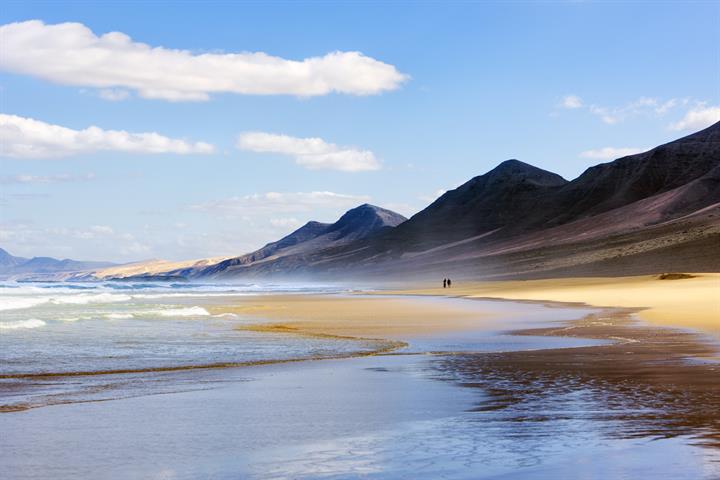
Where To Stay In FuerteventuraA guide to the best places to stay in Fuerteventura. Inspiration for a holiday on the beach, partying and rural escapes... |
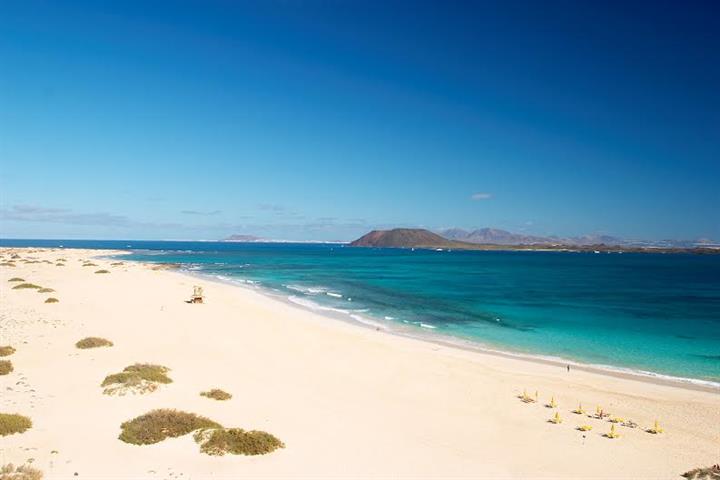
Top 5 places to go on FuerteventuraThe 5 best things to do and places to go on the island of Fuerteventura. Your trip wouldn´t be complete without seeing these places! |
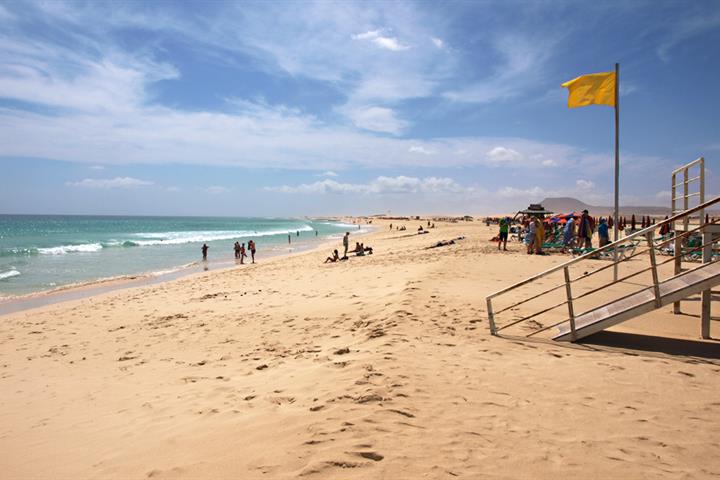
Fuerteventura, From Beach Resort to UNESCO Biosphere ReserveFuerteventura is known for its beaches, but it has far more attractions that are not so well known. For a start it's a UNESCO Biosphere Reserve. |
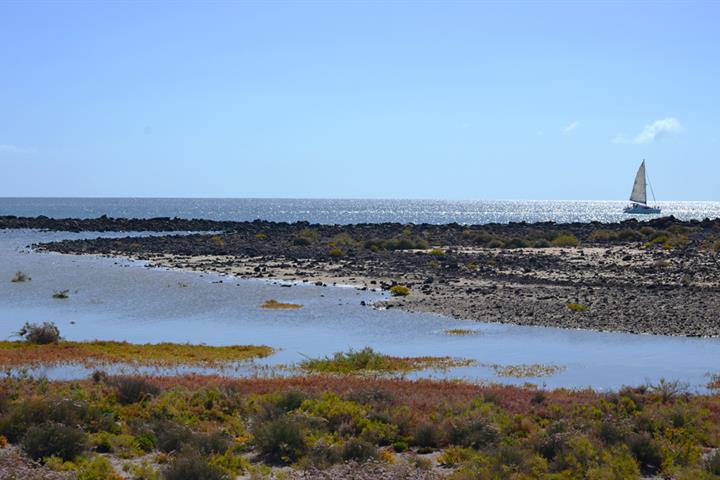
Isla de Lobos, an idyllic day trip from FuerteventuraFor a day trip with a difference, catch a ferry from Corralejo on Fuerteventura to the beautiful little deserted island of Isla de Lobos. |
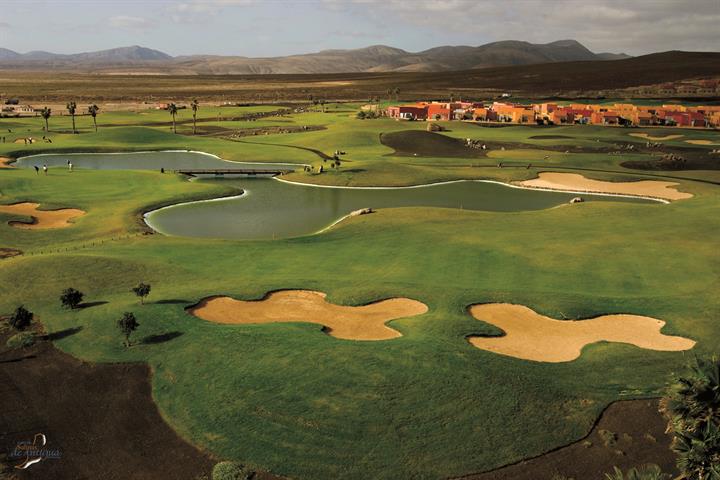
Work on that swing of yours on Fuerteventura's golf coursesFuerteventura's rightly lauded for its beaches. But there's green as well as yellow on the island. Especially on Fuerteventura's five golf courses. |
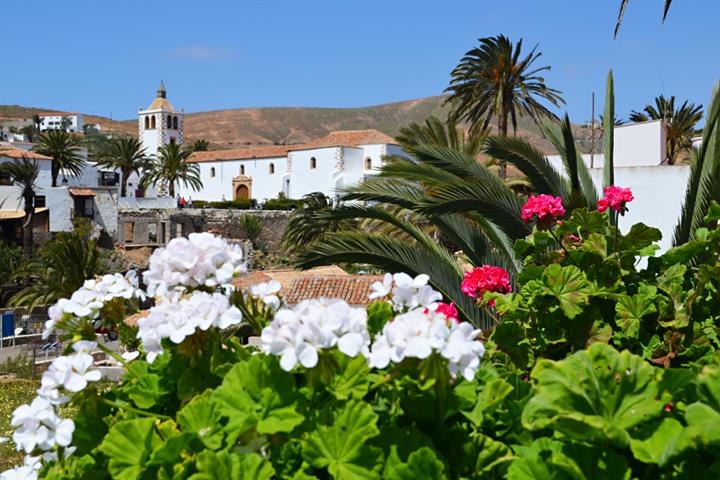
Driving on Fuerteventura, discovering the southern sightsA driving route taking in the most interesting things to see in the south of Fuerteventura. |
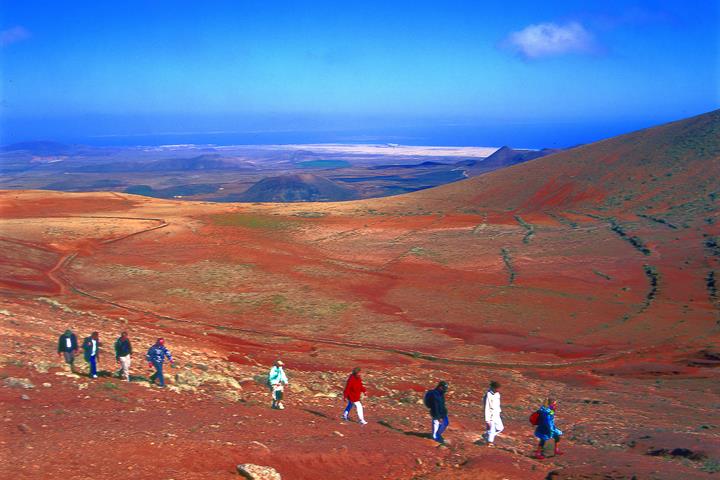
Five fantastic ways Fuerteventura's an ideal hiking destinationDid you expect to be spending your Fuerteventura holiday lying on a beach? The island's perfectly geared to active travellers. So get out and about. |
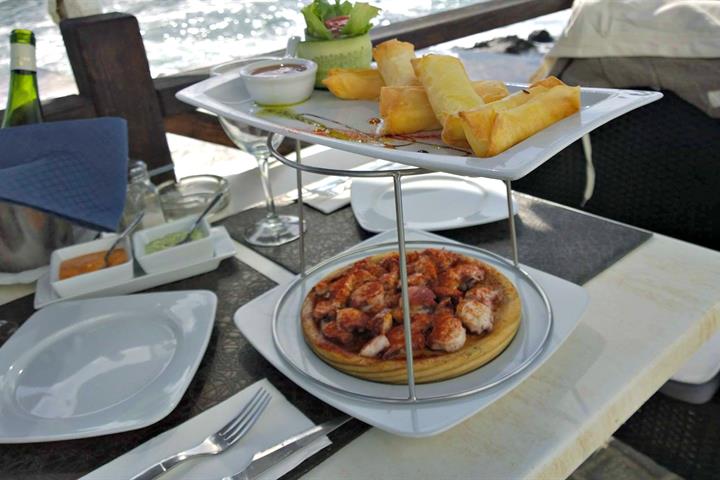
Top 10 Fuerteventura restaurantsSure, you can get an English breakfast in Fuerteventura. But why not try local food? Or go global at one of the island's more specialist eateries. |

Where To Stay In FuerteventuraA guide to the best places to stay in Fuerteventura. Inspiration for a holiday on the beach, partying and rural escapes... |

Top 5 places to go on FuerteventuraThe 5 best things to do and places to go on the island of Fuerteventura. Your trip wouldn´t be complete without seeing these places! |

Fuerteventura, From Beach Resort to UNESCO Biosphere ReserveFuerteventura is known for its beaches, but it has far more attractions that are not so well known. For a start it's a UNESCO Biosphere Reserve. |

Isla de Lobos, an idyllic day trip from FuerteventuraFor a day trip with a difference, catch a ferry from Corralejo on Fuerteventura to the beautiful little deserted island of Isla de Lobos. |

Work on that swing of yours on Fuerteventura's golf coursesFuerteventura's rightly lauded for its beaches. But there's green as well as yellow on the island. Especially on Fuerteventura's five golf courses. |

Driving on Fuerteventura, discovering the southern sightsA driving route taking in the most interesting things to see in the south of Fuerteventura. |

Five fantastic ways Fuerteventura's an ideal hiking destinationDid you expect to be spending your Fuerteventura holiday lying on a beach? The island's perfectly geared to active travellers. So get out and about. |

Top 10 Fuerteventura restaurantsSure, you can get an English breakfast in Fuerteventura. But why not try local food? Or go global at one of the island's more specialist eateries. |

Where To Stay In FuerteventuraA guide to the best places to stay in Fuerteventura. Inspiration for a holiday on the beach, partying and rural escapes... |

Top 5 places to go on FuerteventuraThe 5 best things to do and places to go on the island of Fuerteventura. Your trip wouldn´t be complete without seeing these places! |

Fuerteventura, From Beach Resort to UNESCO Biosphere ReserveFuerteventura is known for its beaches, but it has far more attractions that are not so well known. For a start it's a UNESCO Biosphere Reserve. |

Isla de Lobos, an idyllic day trip from FuerteventuraFor a day trip with a difference, catch a ferry from Corralejo on Fuerteventura to the beautiful little deserted island of Isla de Lobos. |

Work on that swing of yours on Fuerteventura's golf coursesFuerteventura's rightly lauded for its beaches. But there's green as well as yellow on the island. Especially on Fuerteventura's five golf courses. |

Driving on Fuerteventura, discovering the southern sightsA driving route taking in the most interesting things to see in the south of Fuerteventura. |

Five fantastic ways Fuerteventura's an ideal hiking destinationDid you expect to be spending your Fuerteventura holiday lying on a beach? The island's perfectly geared to active travellers. So get out and about. |

Top 10 Fuerteventura restaurantsSure, you can get an English breakfast in Fuerteventura. But why not try local food? Or go global at one of the island's more specialist eateries. |
Reviews for Jandía Playa
Average overall ratings - Based on 4 reviews.
City
| City: |
Submitted by: paul mcdonald
8. Sep 2011
This review is in English
This review is in English
Jandía Playa review
not excactly in jandia about a 20 minute drive to jandia a car is a must
Report abuse
You found this abusive
| City: |
Submitted by: Bloch Patrice
1. Jun 2014
This review is in French
This review is in French
Jandía Playa review
quartier très calme.endroit ou il fait bon de se reposer.
Report abuse
You found this abusive
| City: |
Submitted by: Margit G. Jensen
22. Nov 2012
This review is in Danish
This review is in Danish
Jandía Playa review
alt var lukket søndag da vi ankom så man skal handle ind på vejen fx Costa Calma
Report abuse
You found this abusive
| City: |
Submitted by: roberta levati
25. Jun 2012
This review is in Italian
This review is in Italian
Jandía Playa review
bella
Report abuse
You found this abusive